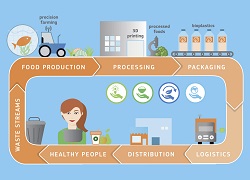FOOD 2030: Innovative EU research ensures food system is future-ready

© European Commission
This systemic approach to connect, scale-up and boost EU Food R&I is referred to as FOOD 2030 and will provide solutions to four overarching food system priorities. These are NUTRITION for sustainable and healthy diets; CLIMATE resilience and environmental sustainability; CIRCULARITY and resource efficiency; and finally, INNOVATION and the empowerment of communities.
Groundbreaking EU research in the spotlight
This CORDIS Results Pack focuses on new approaches contributing solutions to tackling the four FOOD 2030 priorities by showcasing 13 ambitious cutting-edge EU research projects funded under the EU’s FP7 and Horizon 2020 research programmes relevant to food system transformation.
Flourish developed ground and aerial robots to increase agricultural yield, reduce pesticide use and mitigate food security, thus improving sustainability, while INFARM contributed to sustainable agriculture by improving the environmental footprint of plants. RECARE developed measures to combat climate change related soil degradation. HEALTHYMINORCEREALS contributes to climate resilience by investigating minor cereal varieties for biotic and abiotic stress resistance. FOODINTEGRITY encourages food transparency to minimise food fraud and ensure a responsible food supply chain. PROHEALTH also promotes responsibility by reducing diseases in pig and poultry, and DEPURGAN provides eco-friendly manure management. EARLYNUTRITION explores how early nutrition programming and lifestyle factors impact the rates of obesity and related disorders.
A range of technologies, approaches and business models are reflected in FoodSMART, which created a new mobile app to help consumers make healthier food choices, while NUDGE-IT combats obesity by analysing what determines our food choices. SUCCESS examines processing and production in the seafood industry and proposes ways to enhance competitiveness and sustainability. ARBUATEM raises awareness of the dangers of using waste water for urban agriculture in low and middle-income countries. Finally, MareFrame engages stakeholders in developing tools to sustain healthy marine ecosystems and fisheries.